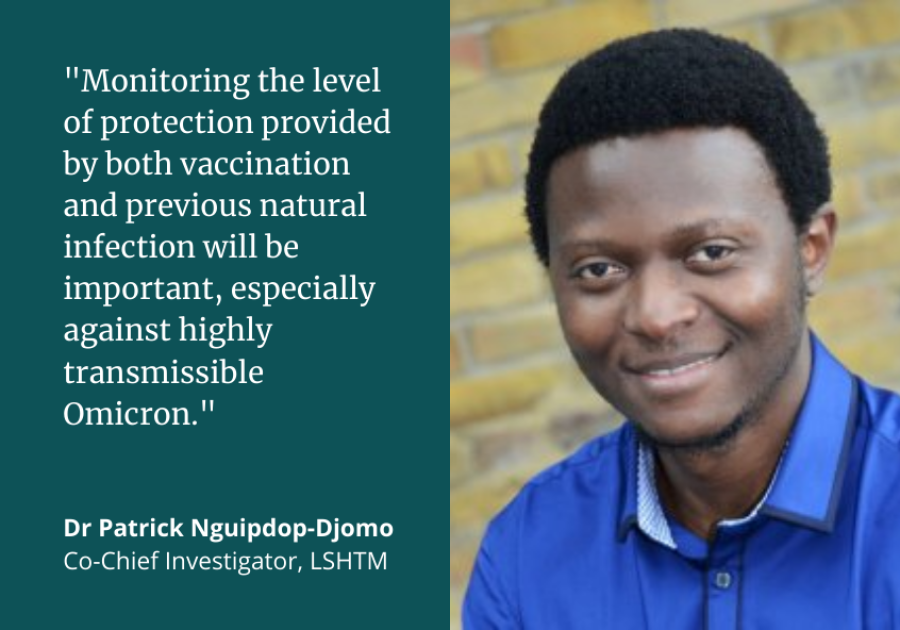Nearly all of secondary school pupils estimated to have antibodies against COVID-19
1 April 2022 London School of Hygiene & Tropical Medicine London School of Hygiene & Tropical Medicine https://lshtm.ac.uk/themes/custom/lshtm/images/lshtm-logo-black.png
97% of secondary school pupils and 62% of primary school pupils in England tested positive for having COVID-19 antibodies between 10 January and 3 February 2022, according to new data from the Schools Infection Survey (SIS).
This is a significant increase in antibody prevalence compared to the first round of antibody testing, from 82% of secondary school students and 40% of primary school students between November and December 2021.
In the second round of antibody testing for the SIS project, which is jointly led by the London School of Hygiene & Tropical Medicine (LSHTM), Office for National Statistics (ONS) and UK Health Security Agency (UKHSA), 7,664 students from 106 primary schools and 44 secondary schools took part.
The researchers conclude that the high levels of antibody positivity among secondary school students are driven by both vaccination and natural infection. Among this age group, 46% of students were vaccinated and tested positive for antibodies, while 51% were unvaccinated and tested positive for antibodies. At the time of testing, 47% of secondary school pupils had received at least one vaccination dose.
In all ages, the prevalence of COVID-19 antibodies continues to increase steadily by age for all pupils. Over half of pupils aged four to seven years old tested positive for COVID-19 antibodies.
Dr Patrick Nguipdop-Djomo, co-chief investigator of the study at LSHTM, said: “The increase in antibody prevalence in both primary and secondary school students since our last testing in November is consistent with the high infection rates we saw in these children in the autumn term.
“Of note, nearly all vaccinated and unvaccinated secondary school pupils had SARS-CoV-2 antibodies in this January’s round of testing. Monitoring the level of protection provided by both vaccination and previous natural infection will be important, especially against the highly transmissible Omicron variant. There is an urgent need to plan for the possibility of new variants evading the immunity provided by previous infection or vaccination.
“As ever, thank you to all the families and school children who contributed to this important surveillance study to help us understand more about this disease which is still affecting our daily lives.”
Fiona Dawe, Deputy Director, Wider Surveillance Studies at the ONS, said: “Latest data from the Schools Infection Survey continue to show a high level of antibodies in children in schools across England.
“Over half of pupils aged four to seven years are testing positive for COVID-19 antibodies, offering this age group some protection from the virus where they likely won’t have been offered a vaccine.
“We’ve now completed the final round of testing and I would like to say a huge thank you to all of our pupils, parents and schools for their commitment in helping us gather this vital information.”
Dr Shamez Ladhani, Consultant Paediatrician at the UK Health Security Agency and the study’s chief investigator, said:
“This study shows that the vast majority of secondary school pupils and over half of primary school pupils had COVID-19 antibodies between January to February 2022. UKHSA developed the new oral fluid (saliva) which has enabled pupils to test easily, allowing us to continue monitoring the impact of the pandemic on children and young people in educational settings.”
This researchers acknowledge the limitations of this study, including the test based on oral fluid collection as a non-invasive alternative to collecting blood, which has lower sensitivity (around 80%) for unvaccinated pupils.
Publication
COVID-19 Schools Infection Survey, antibody data, England. Office for National Statistics.
LSHTM's short courses provide opportunities to study specialised topics across a broad range of public and global health fields. From AMR to vaccines, travel medicine to clinical trials, and modelling to malaria, refresh your skills and join one of our short courses today.